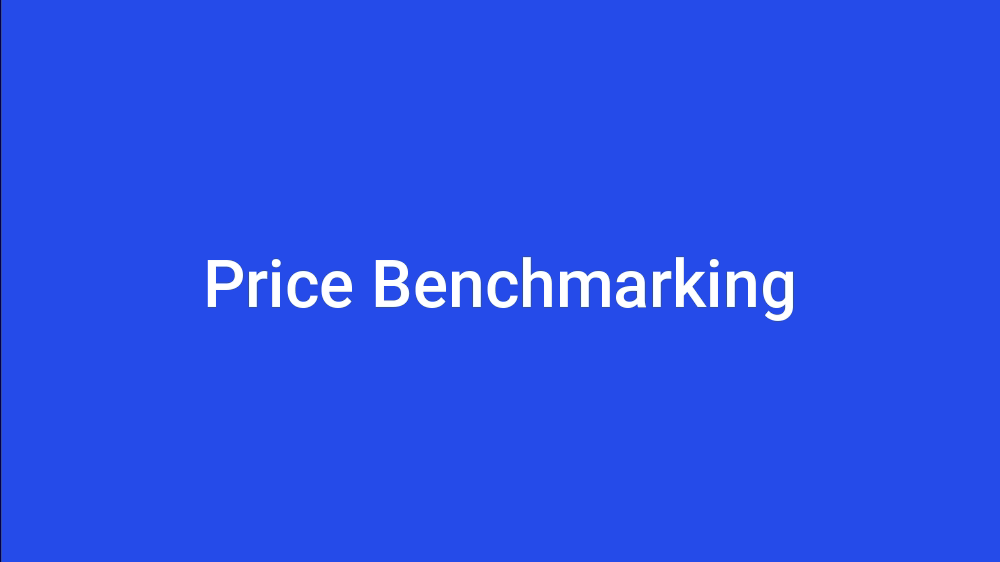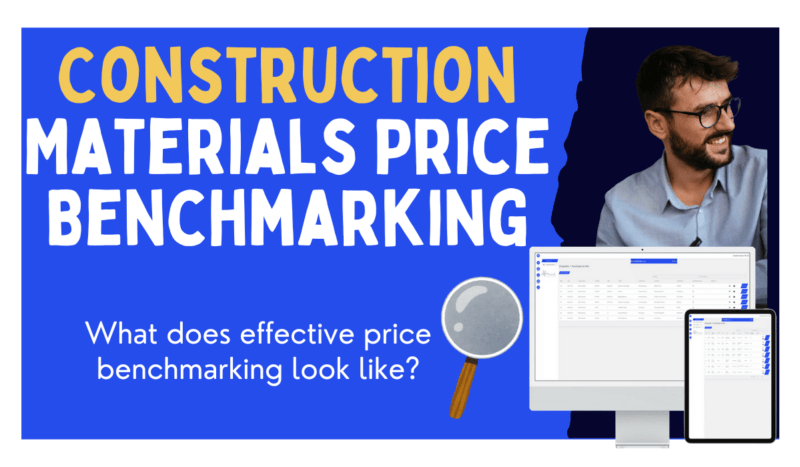Managing costs effectively is a key part of ensuring the success of any construction project. One of the most powerful tools in a procurement manager’s arsenal is price benchmarking – comparing the prices of materials from different merchants to ensure you’re getting the best possible deal.
What does effective price benchmarking look like?

Effective price benchmarking involves gathering data on the prices of similar materials and products and analysing this data to determine the best value for money. In addition to price, it’s also good practice to compare things like delivery distance, timing and pricing to truly determine whether you’re getting an appropriate deal.
This process helps procurement managers make informed decisions, avoid overpaying, and negotiate better deals with suppliers.
The value of price benchmarking in construction materials procurement
Beyond Cost Savings: The Hidden Benefits of Accurate Price Benchmarking
While accurate price benchmarking is undeniably a powerful tool for achieving material cost savings, its benefits extend far beyond financial gains. By embedding benchmarking into your procurement strategy, businesses can unlock a host of additional advantages:
1. Improved Negotiation Power
Having access to precise price benchmarks equips procurement teams with the data they need to negotiate from a position of strength. Suppliers are more likely to offer competitive rates when they know you’re well-informed about market prices. This fosters a more transparent and mutually beneficial relationship with suppliers.
2. Enhanced Supply Chain Resilience
Accurate price benchmarking reveals fluctuations and trends in material costs over time, helping businesses anticipate market shifts. This foresight enables companies to plan more effectively, mitigating risks of supply shortages or sudden price hikes.
3. Driving Operational Efficiency
By streamlining the process of comparing quotes and identifying the most competitive options, benchmarking reduces the time spent on repetitive procurement tasks. Teams can refocus their efforts on strategic initiatives, such as identifying sustainable materials or fostering supplier innovation.
4. Promoting Accountability and Transparency
Price benchmarking adds a layer of accountability to procurement processes. It ensures that material purchases align with company budgets and policies, minimizing the risk of overpaying or deviating from financial targets.
5. Supporting Sustainable Procurement Goals
With detailed cost data, businesses can explore alternative suppliers or materials that offer better value without compromising on quality. Often, this leads to discovering greener options that support sustainability initiatives, creating a win-win for the planet and your bottom line.
Putting Price Benchmarking into Action
The key to unlocking these benefits lies in using tools that provide real-time, accurate market insights. Platforms like The Build Chain not only simplify the benchmarking process but also enable procurement teams to make data-driven decisions faster and more confidently.
By embracing price benchmarking as a strategic asset, businesses can go beyond cost savings and build a procurement process that is agile, efficient, and future-ready.
How The Build Chain facilitates price benchmarking
The Build Chain platform is designed to make price benchmarking easy and effective. Here’s how it works:
- Quick Quote Requests: Users can send out enquiries to multiple suppliers simultaneously, collecting a broad range of prices in a short time
- Centralised Comparison Tool: The platform provides tools to compare quotes side-by-side, highlighting the best deals based on price, delivery time, and merchant location
- Analytics and Reporting: Detailed analytics and reporting features allow users to track price trends, identify savings opportunities, and make data-driven procurement decisions.
We discuss this topic further in our post: How To Benchmark Pricing and Achieve Best Value for Construction Materials.
A real life example from a user of The Build Chain
North Yorkshire-based SME contractor Rasico Construction faced challenges with fluctuating material costs and time-consuming material sourcing processes. By leveraging The Build Chain for materials procurement, Rasico was able to compare quotes from multiple suppliers quickly and efficiently.
Rachel Jolley, Rasico Construction Managing Director, said:
“The Build Chain has been a fantastic introduction to our business, saving us substantial amounts of money on many items and equally as important, it’s saved us a substantial amount of time. With industry-wide price increases, every penny counts towards making projects commercially viable.”
Price benchmarking is an essential practice for any construction company looking to optimise procurement processes and control costs. By systematically comparing prices and leveraging data-driven insights, companies can achieve significant savings, make informed purchasing decisions, and negotiate better deals with suppliers.
At The Build Chain, we provide a powerful platform that simplifies and enhances the price benchmarking process, leading to better procurement outcomes and a stronger bottom line.




